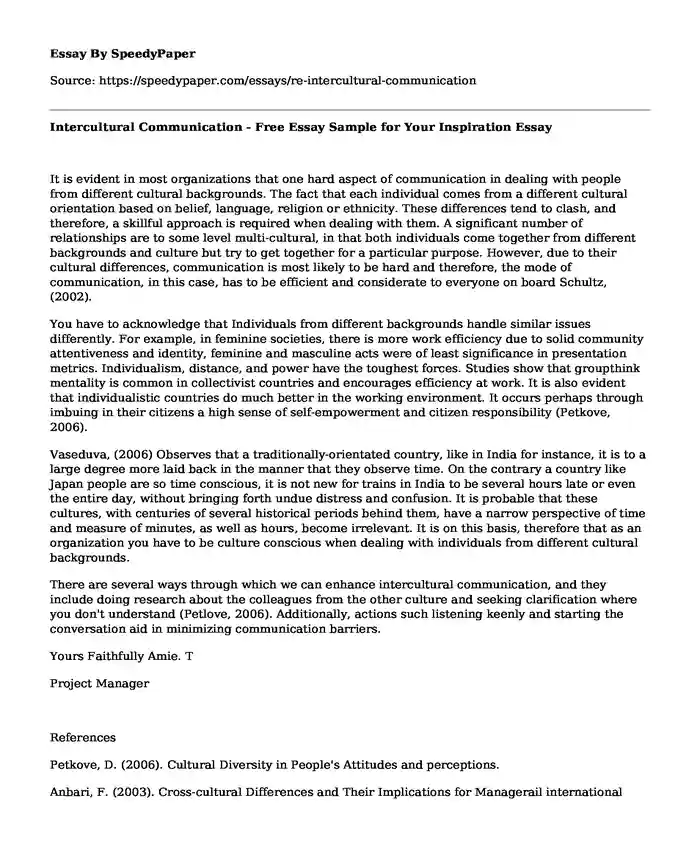
| Type of paper: | Case study |
| Categories: | Management Intercultural communication |
| Pages: | 2 |
| Wordcount: | 411 words |
It is evident in most organizations that one hard aspect of communication in dealing with people from different cultural backgrounds. The fact that each individual comes from a different cultural orientation based on belief, language, religion or ethnicity. These differences tend to clash, and therefore, a skillful approach is required when dealing with them. A significant number of relationships are to some level multi-cultural, in that both individuals come together from different backgrounds and culture but try to get together for a particular purpose. However, due to their cultural differences, communication is most likely to be hard and therefore, the mode of communication, in this case, has to be efficient and considerate to everyone on board Schultz, (2002).
You have to acknowledge that Individuals from different backgrounds handle similar issues differently. For example, in feminine societies, there is more work efficiency due to solid community attentiveness and identity, feminine and masculine acts were of least significance in presentation metrics. Individualism, distance, and power have the toughest forces. Studies show that groupthink mentality is common in collectivist countries and encourages efficiency at work. It is also evident that individualistic countries do much better in the working environment. It occurs perhaps through imbuing in their citizens a high sense of self-empowerment and citizen responsibility (Petkove, 2006).
Vaseduva, (2006) Observes that a traditionally-orientated country, like in India for instance, it is to a large degree more laid back in the manner that they observe time. On the contrary a country like Japan people are so time conscious, it is not new for trains in India to be several hours late or even the entire day, without bringing forth undue distress and confusion. It is probable that these cultures, with centuries of several historical periods behind them, have a narrow perspective of time and measure of minutes, as well as hours, become irrelevant. It is on this basis, therefore that as an organization you have to be culture conscious when dealing with individuals from different cultural backgrounds.
There are several ways through which we can enhance intercultural communication, and they include doing research about the colleagues from the other culture and seeking clarification where you don't understand (Petlove, 2006). Additionally, actions such listening keenly and starting the conversation aid in minimizing communication barriers.
Yours Faithfully Amie. T
Project Manager
References
Petkove, D. (2006). Cultural Diversity in People's Attitudes and perceptions.
Anbari, F. (2003). Cross-cultural Differences and Their Implications for Managerail international Projects.
Schultz, W. (2002). Environmental and Attitudes Across Cultures.
Cite this page
Intercultural Communication - Free Essay Sample for Your Inspiration. (2022, Feb 17). Retrieved from https://speedypaper.com/essays/re-intercultural-communication
Request Removal
If you are the original author of this essay and no longer wish to have it published on the SpeedyPaper website, please click below to request its removal:
- Free Essay Sample on Green Mark Platinum Award
- Essay Example Describing Early Christian Lives
- Procreation and Reproduction Essay Example
- Free Essay Sample Dedicated to the Refugee Crisis in Europe
- Essay Example on ICT and Economic Growth
- Paper Example: Fall Prevention Programs
- Free Essay Example: Car Advertising
Popular categories




